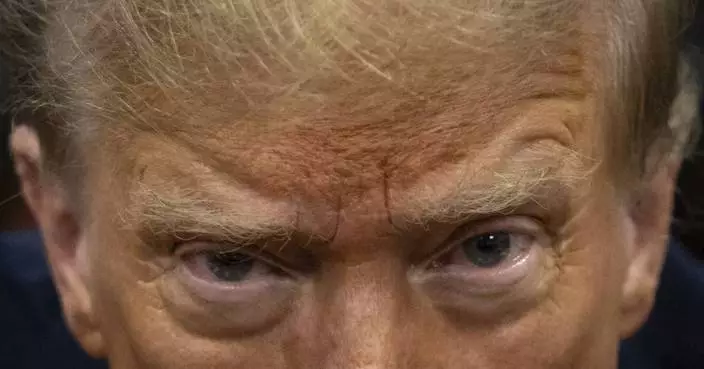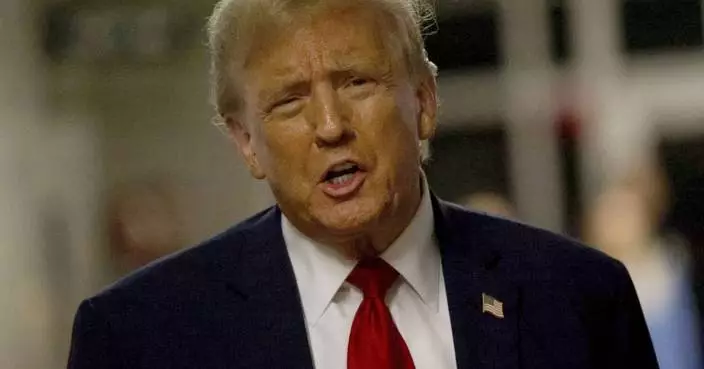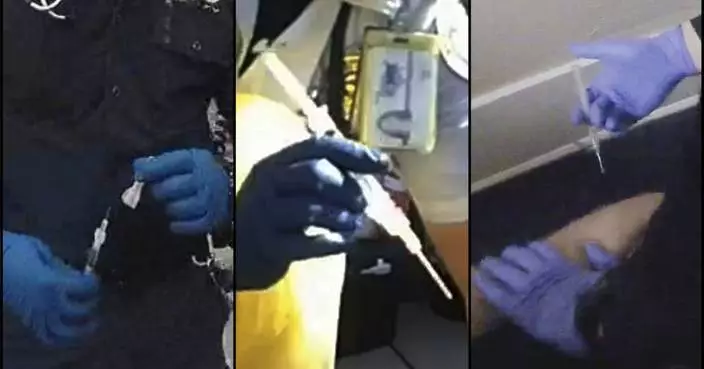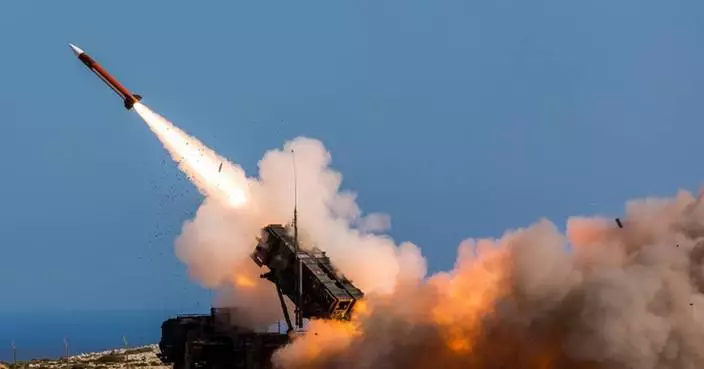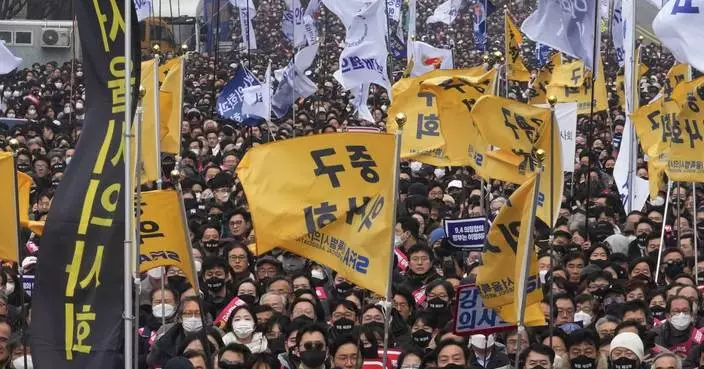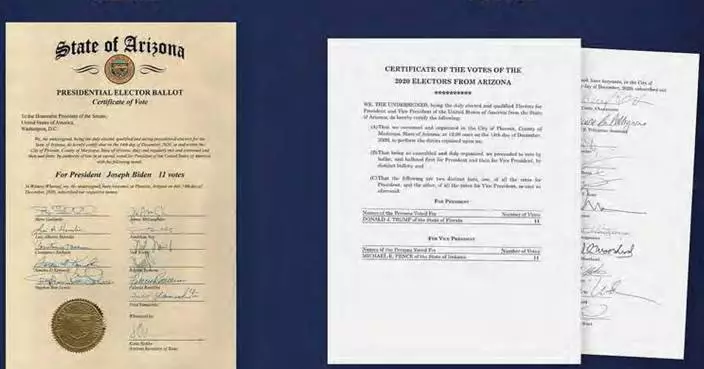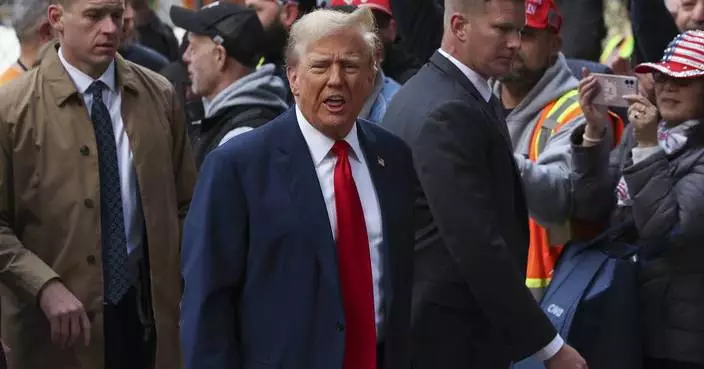President Donald Trump got the history-making handshake he wanted with North Korea's Kim Jong Un. Now, with the smiling snapshot a part of history, new details are emerging about the bizarre behind-the-scenes negotiations that led up to the summit — and about the president's post-summit frustrations with how it's being portrayed.
Setting up the Singapore meeting was no easy feat for the technically still-warring heads of state, requiring planners to accommodate confounding requests and paranoia. But neither has it been easy for Trump to sell the plan to a doubting class of experts, allies and the media. He's chafing at the skepticism swirling about the nuclear accord that he wants to define his legacy.
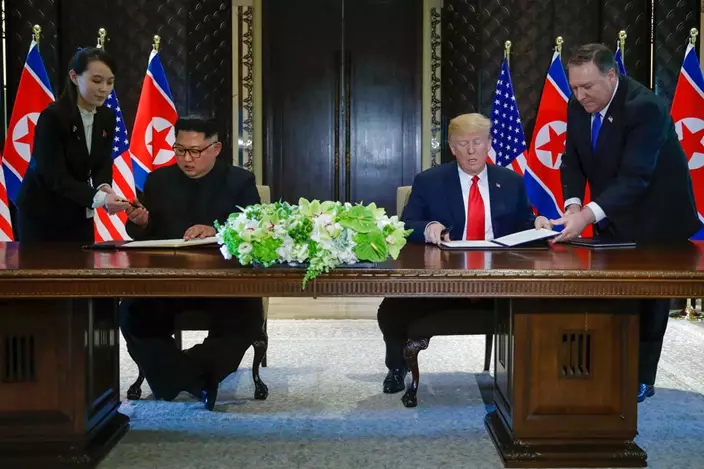
FILE - In this Tuesday, June 12, 2018, file photo, North Korea leader Kim Jong Un and U.S. President Donald Trump prepare to sign a document at the Capella resort on Sentosa Island in Singapore. At the ceremony, a gloved North Korean official inspected Kim’s chair and the black felt-tipped pen bearing Trump’s signature in gold that was positioned for Kim’s use. At the last minute, Kim’s sister, Kim Yo-jong, far left, provided a pen of her own for his use. (AP Photo/Evan Vucci, File)
Scenes from inside the summit:
"ALIEN" TERRITORY?
Like talking with "aliens." Sitting at tables at the luxurious Capella Hotel in Singapore or in the sparse Demilitarized Zone on the Korean Peninsula, that's how U.S. officials involved in negotiations with their North Korean counterparts described their conversations ahead of the summit.
The North Koreans had never before participated in an event of the sort, were unfamiliar with notions of press access and deeply afraid about both espionage and assassination. The North Korean logistics teams struck the Americans as organized, detail-oriented and mission-focused, said one official involved in the planning. There were also a number of women involved in senior roles, surprising to the U.S. side.
On the day before the summit, U.S. and North Korean officials met throughout the day in Singapore to hash out areas of agreement for what became the joint statement issued by the two leaders on Tuesday. The U.S. team wanted to send in an official photographer to capture the moment for history — a manifestation of the White House's desire to turn the summit into an international media event — but the North Koreans balked.
"How do we know she's not a spy?" protested the North Koreans. They eventually agreed the photographer could attend, said an official familiar with the discussions with the North Koreans who wasn't authorized to discuss it and insisted on anonymity.
Similar worries had come up earlier in the talks when the Korean delegation voiced concerns that cameras belonging to the press could be concealed weapons.
THE TRUST GAP
There was hardly trust on the U.S. side either. Kim, after all, is accused by the U.S. of ordering the murder of his half brother with a nerve agent last year.
From the first logistical talks in Singapore, it was clear to U.S. officials that overcoming the security trust gap was among the most significant hurdles to getting the two leaders into the same room.
For every person the White House wanted to put in the room for the meetings, the North wanted to know how they would know the person was not there to spy on the proceedings or harm Kim.
U.S. officials credited the Singaporean government for helping to prevent the mistrust from sinking the summit.
Checkpoints were jointly patrolled by U.S., North Korean, and Singaporean officials, with some journalists on site required to undergo separate security sweeps by each of the three parties. U.S. officials agreed to cap the number of U.S. government officials they allowed onto the luxury summit property to match the far smaller North Korean delegation.
It left all but the most senior American negotiators, including many subject matter experts, monitoring the proceedings via television and emailed updates from the president's hotel, a 20-minute drive away.
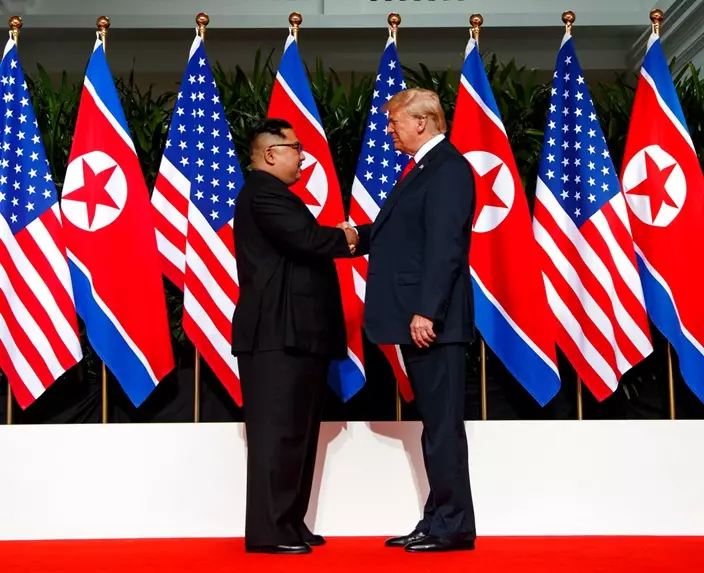
FILE - In this Tuesday, June 12, 2018, file photo, North Korean leader Kim Jong Un, left, and U.S. President Donald Trump shake hands prior to their meeting on Sentosa Island in Singapore. Trump got the history-making handshake he wanted with Kim. Now that the snapshot is a part of history, new details are emerging about the behind-the-scenes negotiations that led up to the summit. (AP Photo/Evan Vucci, File)
OLD HABITS DIE HARD
At a formal signing ceremony Tuesday afternoon, a gloved North Korean official inspected Kim's chair and the black felt-tipped pen bearing Trump's signature in gold that was positioned for Kim's use.
At the last minute, Kim's sister, Kim Yo-jong, who was standing to his side, provided a pen of her own for his use.
The U.S.-supplied pen was later retrieved, unused, by a White House staffer.
EQUAL PARTNERS
Throughout the summit preparations, U.S. officials described the North Koreans as focused on ensuring they were not the junior partner in the talks.
In a symbolic concession, the DPRK (Democratic People's Republic of Korea) was listed above the U.S. in the official summit logo on credentials for the summit. The White House also agreed to limit the number of journalists allowed to cover some events to mirror the North Korean contingent of state-run media.
Still, Trump appeared to be in the driver's seat, clapping Kim on the back and directing over to their interpreters to start their one-on-one meeting. The U.S. president also signaled for reporters in the room to be escorted out — after both took questions from the journalists.
FRUSTRATION FACTOR
On the final day before the summit, officials at the White House National Security Council back in Washington grew incensed over a New York Times report suggesting that "science is unwelcome" in Trump's administration and that the U.S. negotiating team was devoid of nuclear physicists. So the White House issued a directive to Secretary of State Mike Pompeo: He would go in front of cameras in Singapore and call out the newspaper by name, an official familiar with the instruction said. Pompeo complied.
"Before discussing the summit, I want to address a report in The New York Times," Pompeo opened. "Any suggestion that the United States somehow lacks the technical expertise across government or lacks it on the ground here in Singapore is mistaken."
Now that he's back home, Trump has been fuming privately and publicly over the skeptical news coverage about his signed agreement with Kim. Never steeped in details or history, the president feels he has made ground-breaking progress, as evidenced by his grand statements telling the world to "sleep well." Back in DC, in a terrible mood, he is frustrated by all the questions about the fine print.
Trump has been calling lawmakers to express enthusiasm for the agreement — but also complaining that he has not had more robust support from GOP lawmakers, said a person with knowledge of the calls, who spoke on condition of anonymity to share internal conversations. While the president calls the summit a "first step," with more meetings sure to come, he also has been arguing that he has already done more than his predecessor, President Barack Obama.
NEW YORK (AP) — Defense lawyers in Donald Trump’s hush money trial are digging Friday into assertions of the former publisher of the National Enquirer and his efforts to protect Trump from negative stories during the 2016 election.
David Pecker returned to the witness stand for the fourth day as defense attorneys tried to poke holes in his testimony, which has described helping bury embarrassing stories Trump feared could hurt his campaign.
Pecker has painted a tawdry portrait of “catch and kill” tabloid schemes — catching a potentially damaging story by buying the rights to it and then killing it through agreements that prevent the paid person from telling the story to anyone else.
The cross-examination, which began Thursday, will cap a consequential week in the criminal cases the former president is facing as he vies to reclaim the White House in November.
The charges center on $130,000 in payments that Trump’s company made to his then-lawyer, Michael Cohen. He paid that sum on Trump’s behalf to keep porn actor Stormy Daniels from going public with her claims of a sexual encounter with Trump a decade earlier. Trump has denied the encounter ever happened.
Prosecutors say Trump obscured the true nature of those payments and falsely recorded them as legal expenses. He has pleaded not guilty to 34 felony counts of falsifying business records.
The case is the first-ever criminal trial of a former U.S. president and the first of four prosecutions of Trump to reach a jury.
Currently:
— Key moments from the Supreme Court arguments on Donald Trump’s immunity claims
— Trading Trump: Truth Social’s first month of trading has sent investors on a ride
— These people were charged with interfering in the 2020 election. Some are still in politics today
— Key players: Who’s who at Donald Trump’s hush money criminal trial
— The hush money case is just one of Trump's legal cases. See the others here
Here's the latest:
A lawyer for Donald Trump in his hush money trial turned Friday to the 2016 deal the National Enquirer’s parent reached with former Playboy model Karen McDougal.
The $150,000 agreement gave American Media exclusive rights to McDougal’s account of any relationship with “any then-married man.” McDougal claims she and Trump had an affair. Trump denies it.
The contract also called for McDougal to do work for various American Media titles. Former Enquirer publisher David Pecker earlier testified the provision was really about keeping McDougal’s story from becoming public and influencing Trump’s chances at the presidency.
But under questioning Friday from Trump lawyer Emil Bove, Pecker added that American Media had pitched itself as a venue to help McDougal restart her career.
When American Media signed its agreement with her, “you believed it had a legitimate business purpose, correct?” Bove asked.
“I did,” Pecker said.
The company ended up running more than 65 stories in her name, he said.
McDougal’s story, and American Media’s deal with her, ultimately became public anyway, in a Wall Street Journal article four days before the 2016 election, after early and absentee voting had started.
The insistence of Donald Trump's defense in his hush money trial to refer to him as “President Trump,” even when describing events that took place before his election, is rankling prosecutors.
Trump’s lawyers said at the outset of the trial that they’d refer to their client as “president” out of respect for the office he held from 2017 to 2021.
But Assistant District Attorney Joshua Steinglass suggested Friday that using the title is anachronistic and confusing when tacked onto questions and testimony that involve things that happened while he was campaigning in 2015 and 2016.
“Objection. He wasn’t President Trump in June of 2016,” Steinglass noted after one such mention. The judge sustained the objection.
A lawyer for Donald Trump in the former president's hush money trial Friday got to a salacious story at the center of former National Enquirer publisher David Pecker’s earlier testimony.
Emil Bove brought out that the Enquirer’s parent company — not Trump or his former lawyer and fixer Michael Cohen — paid a former Trump Tower doorman $30,000 in 2015 for the rights to an unsubstantiated claim that Trump had fathered a child with an employee there.
Pecker testified earlier that the Enquirer thought the tale would make for a huge tabloid story if it were accurate but eventually concluded the story was “1,000% untrue” and never ran it. Trump and the woman involved both have denied the claims.
Bove asked Pecker whether he would run the story if it were true. Pecker replied: “Yes.”
Former National Enquirer publisher David Pecker has testified in Donald Trump's hush money trial that he hatched a plan with Trump and former Trump henchman Michael Cohen in August 2015 for the tabloid to help Trump’s presidential campaign.
But under questioning by Trump’s lawyer, Pecker acknowledged Friday there was no mention at that meeting of the term “catch-and-kill,” which describes the practice of tabloids purchasing the rights to story so they never see the light of day.
Nor was there discussion at the meeting of any “financial dimension,” such as the Enquirer paying people on Trump’s behalf for the rights to their stories, Pecker said.
Pecker also acknowledged that the National Enquirer had been running negative stories about Trump’s 2016 rival Hillary Clinton and her husband, former President Bill Clinton, long before the August 2015 meeting. Pecker previously testified that stories about the Clintons boosted sales of the supermarket tabloid.
Donald Trump's lawyer Emil Bove is getting under the hood of the National Enquirer’s editorial process, seeking to show the tabloid had its own incentives unrelated to any deal with Trump, in the fourth day of testimony in the former president's hush money trial.
To underscore his point, Bove pulled up five unflattering headlines that ran in 2015 about Ben Carson, who ran against Trump in the 2016 GOP primary. Bove noted the information was pulled from publicly available information published in other outlets, including The Guardian.
In his testimony, former Enquirer publisher David Pecker, on the stand for a fourth day, acknowledged that it was standard practice at the publication to recycle stories from other outlets with a new slant.
“Because it’s good, quick and cost efficient, and you would’ve done it without President Trump?” Bove asked.
“Um, yes,” Pecker replied.
The jury’s day in Donald Trump's hush money trial began Friday with an instruction from the judge that it’s OK for prosecutors or defense lawyers to meet with witnesses ahead of a trial to help them prepare to testify.
That pertains to testimony that came out toward the end of Thursday, when Trump lawyer Emil Bove was cross-examining former National Enquirer publisher David Pecker.
Bove resumed questioning Pecker as the fourth day of testimony began in a Manhattan courtroom.
Donald Trump entered court Friday in his hush money trial in Manhattan carrying a thick stack of bound papers, which he said was a report put out by the U.S. House Judiciary Committee about the Manhattan District Attorney’s Office.
The former president said he had not read the report, “but it could be interesting.”
Trump told reporters that he wanted to wish his wife, former first lady Melania Trump, a happy birthday, saying, “It would be nice to be with her, but I’m in a courthouse.”
He said he planned to fly home to Florida, where she is, Friday evening after court wraps for the week.
Even by National Enquirer standards, testimony by its former publisher David Pecker at Donald Trump’s hush money trial this week has revealed an astonishing level of corruption at America’s best-known tabloid and may one day be seen as the moment it effectively died.
“It just has zero credibility,” said Lachlan Cartwright, executive editor of the Enquirer from 2014 to 2017. “Whatever sort of credibility it had was totally damaged by what happened in court this week.”
On Thursday, Pecker was back on the witness stand to tell more about the arrangement he made to boost Trump’s presidential candidacy in 2016, tear down his rivals and silence any revelations that may have damaged him.
A change in the court schedule means Donald Trump won’t be forced off the campaign trail next week to attend a hearing in his hush money criminal trial in New York.
Judge Juan M. Merchan moved a hearing on the former president’s alleged gag order violations to next Thursday, avoiding a conflict with his scheduled campaign events next Wednesday.
Merchan had initially set the hearing for next Wednesday, the trial’s regular off day. Trump is scheduled to hold campaign events that day in Michigan and Wisconsin. His lawyers have urged the judge not to hold any proceedings on Wednesdays so he can campaign.
The hearing — now set for 9:30 a.m. next Thursday, May 2 — pertains to a prosecution request that Trump be penalized for violating his gag order this week on four separate occasions.
The order bars Trump from making comments about witnesses and others connected to the case. Merchan is already mulling holding Trump in contempt of court and fining him up to $10,000 for other alleged gag order violations.
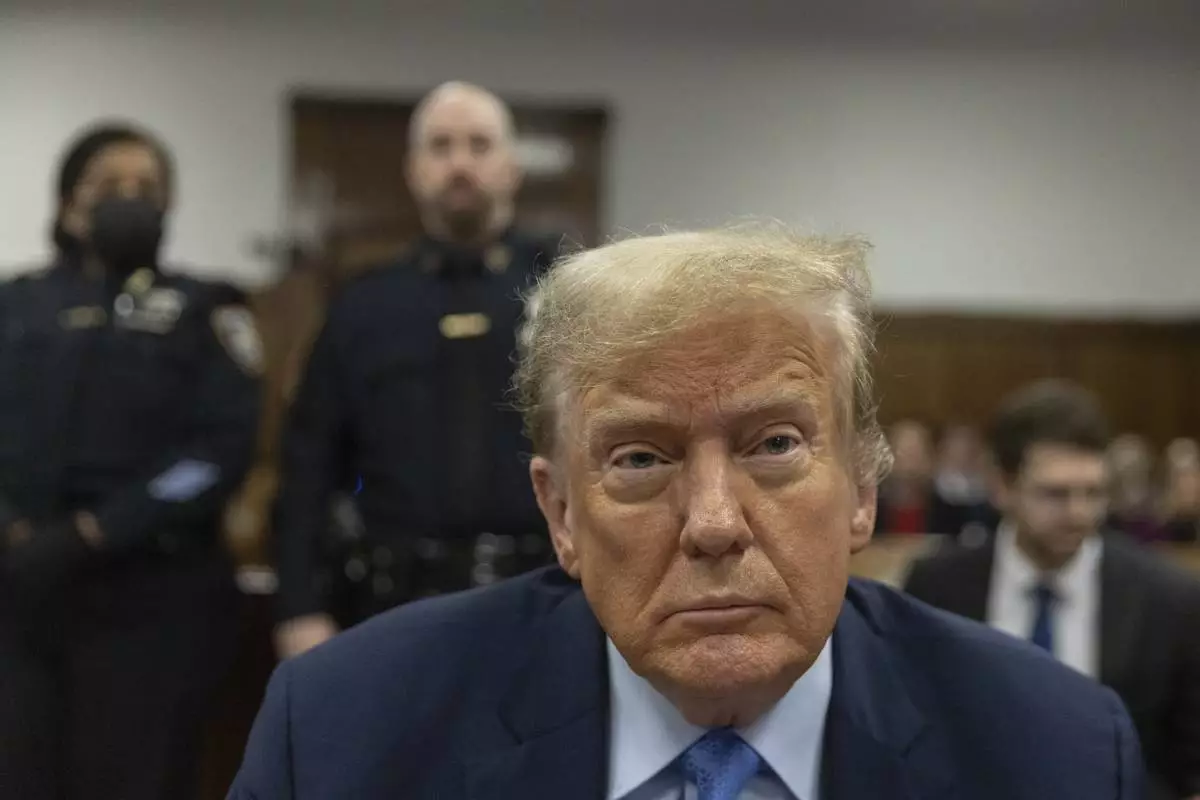
Former President Donald Trump appears at Manhattan criminal court before his trial in New York, Friday, April 26, 2024. (Jeenah Moon/Pool Photo via AP)
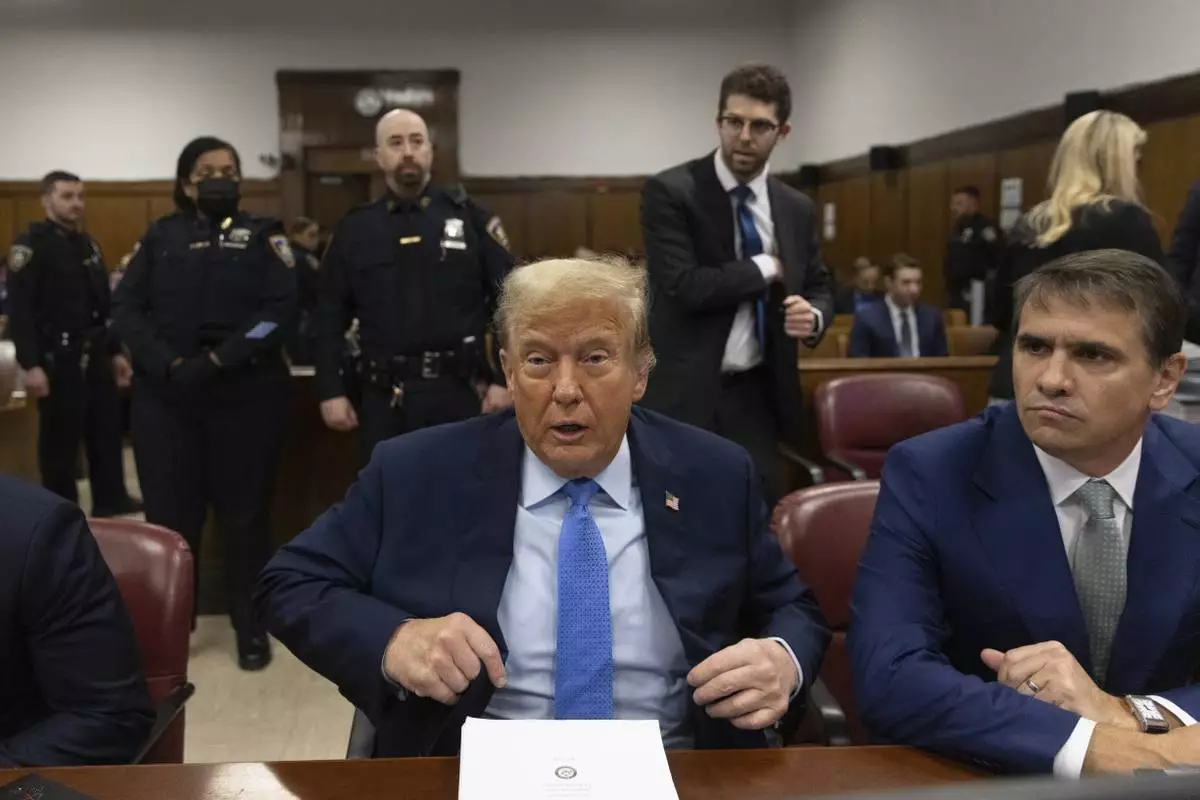
Former President Donald Trump appears at Manhattan criminal court before his trial in New York, Friday, April 26, 2024. (Jeenah Moon/Pool Photo via AP)
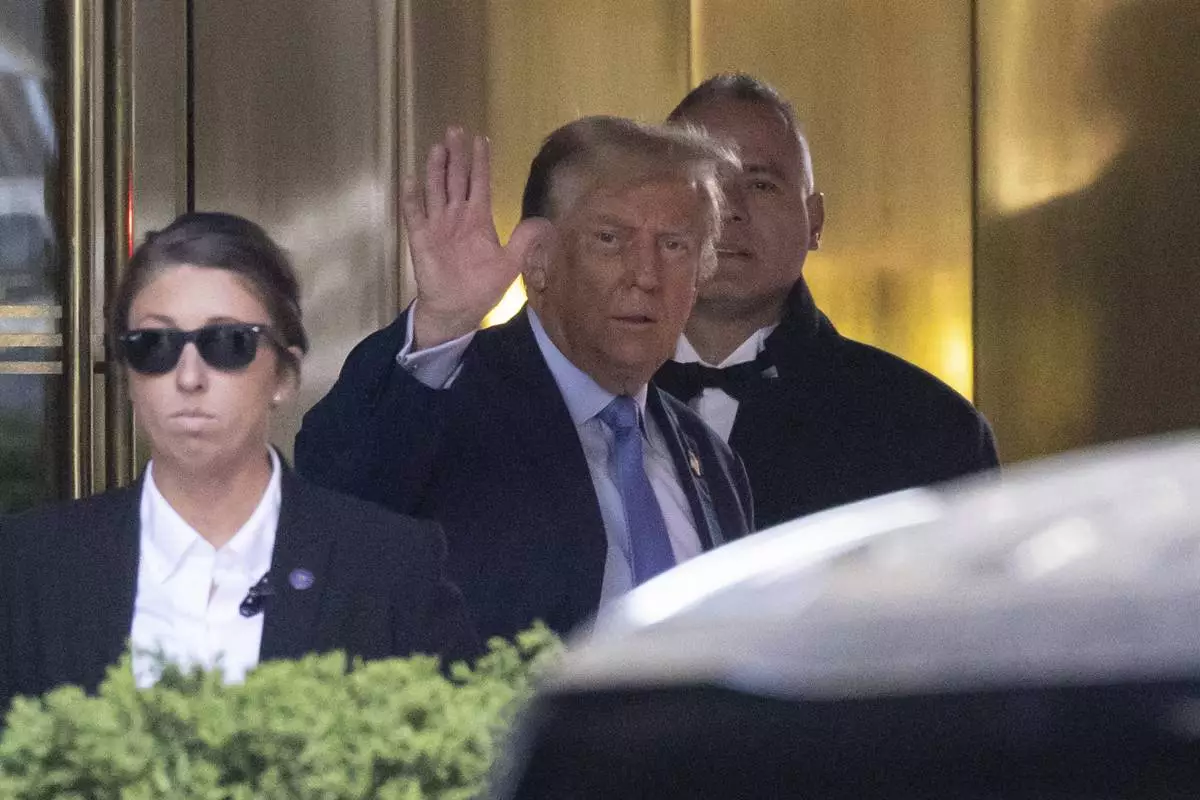
Former president Donald Trump leaves Trump Tower on his way to Manhattan criminal court, Friday, April 26, 2024, in New York. (AP Photo/Yuki Iwamura)
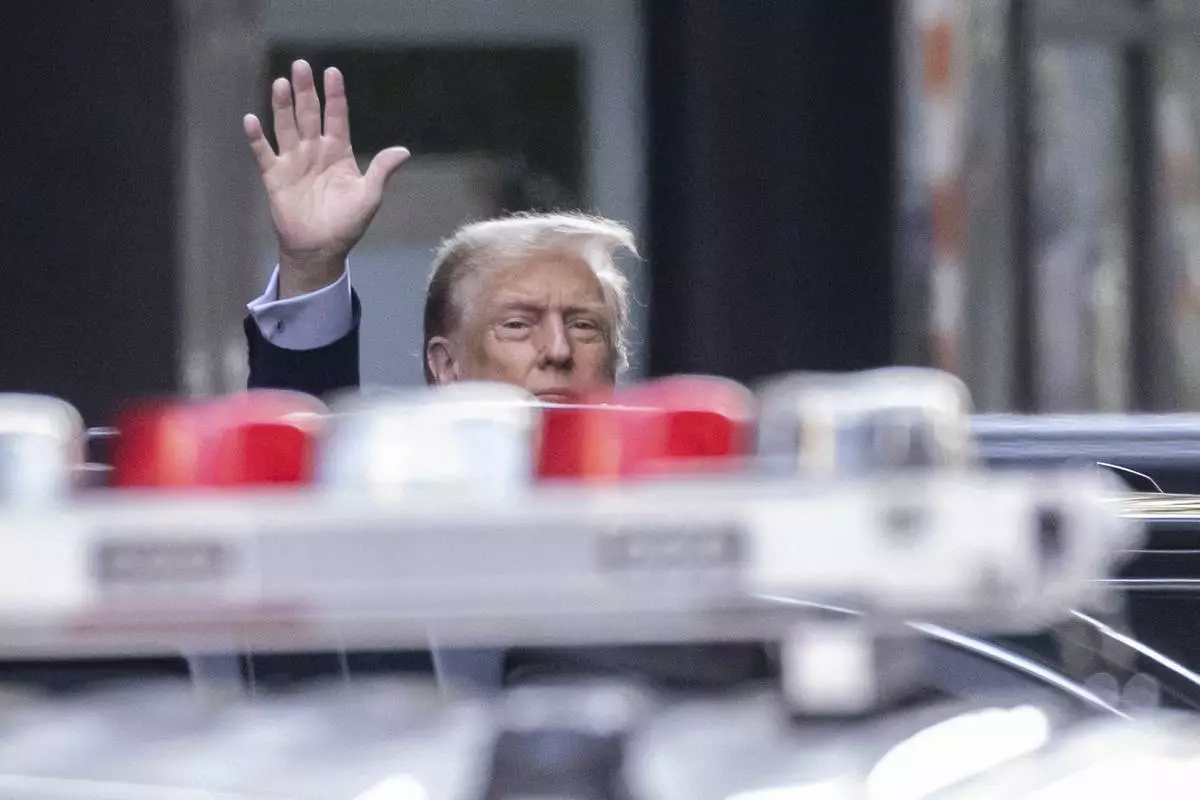
Former president Donald Trump leaves Trump Tower on his way to Manhattan criminal court, Friday, April 26, 2024, in New York. (AP Photo/Yuki Iwamura)









